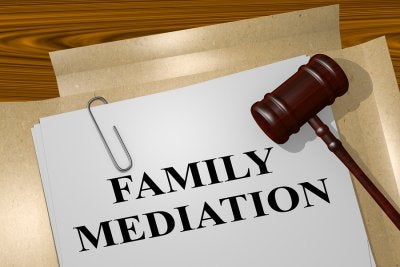-
What You Need to Know About Establishing Paternity
Family law in Baltimore and throughout Maryland allows possible fathers to challenge paternity, regardless of whether or not they are married to the mother. Men may seek to establish paternity because they want to be sure that the child is theirs, while mothers may seek to establish paternity for the purpose of obtaining child support. Family law allows paternity to be legally established with an Affidavit of Parentage, which is a document that the father will sign while the new family is still at the hospital or birthing center. Family law requires that this document be signed in the presence of a notary public.
If the father isn’t completely sure that he is indeed the father, then he may wish to consult a family law attorney before signing this affidavit. The man who is presumed to be the father has the right to request a genetic test before signing it. If paternity is not established with an affidavit, then genetic testing may be requested. The parties can use a consent order to legally establish paternity when the probability of paternity as determined by the genetic test is higher than 99%.

-
Signs of Potential Conflict in Estate Settlements
It’s often assumed that a last will and testament will be followed to the letter, regardless of the personal preferences of the surviving family members. But in fact, will disputes are not as uncommon as you might think. If you suspect you are about to become involved in a will dispute, you should consult an estate planning lawyer in Baltimore without delay. Certain situations may be more likely to lead to a challenge of the will than others.

Multiple Marriages
Divorce and remarriage can be contentious situations after death as well as during life, particularly if the first marriage produced children. Sometimes, it is discovered that the decedent left the entire estate to the last spouse that he or she married. In turn, the inheriting spouse may leave the assets to his or her surviving children. The children from the previous marriage may become disgruntled that they were not named as beneficiaries in the will. These children may decide to contest the will, perhaps by claiming that the spouse from the second marriage coerced the decedent into signing a new will.
Disinherited Children
Deciding whether or not to leave children an inheritance can be a highly sensitive choice. It is the right of the testator to decide exactly how his or her assets will be distributed. In some cases, individuals prefer to give their entire estate to charities, rather than to family. While this is certainly a legally allowed decision, the children or other family members who are disinherited may raise objections to it. Testators may try to avert future will disputes by writing a letter that explains his or her choices.
Disparate Inheritances
A similar situation is when one of the beneficiaries receives a significantly larger inheritance than the others. Sometimes, a testator will decide to leave a larger portion of the estate to an adult child who served as a primary caretaker of the testator. In other cases, the testator may leave a larger inheritance to the family member who is most likely to be financially responsible. Again, this is a legal right of the testator, but it may lead to future conflicts.
-
What Documents Should You Bring to Marital Asset Mediation?
Mediation services available in Baltimore can help you and your spouse avoid the expense and hassle of a lengthy trial. With the help of a neutral mediation lawyer, you and your spouse can review the marital assets and liabilities, and ideally, reach mutually agreeable decisions. To get the most out of each mediation session, you should arrive prepared with all of the necessary documents.

Account Statements
Set aside plenty of time to gather together financial documents. You will need statements of all of your accounts, including sole and joint accounts. These include statements for your checking and savings accounts, money market accounts, pension plans, Roth IRAs, and stock and bond investments. You’ll also need current balance statements for all accounts held for the children, such as CDs, money market accounts, and savings accounts. It may be necessary to hire a professional actuary to determine the present day value of certain accounts such as retirement funds.
Balance Statements
After you have gathered together account statements, it’s time to print out balance statements for all of your credit cards, mortgages, lines of credit, and home equity loans. Student loans, motor vehicle loans, personal loans, and business loans also play a role in marital asset mediation. Additionally, you’ll need to bring information on any pending civil lawsuits in which either of you or both of you are named as defendants.
Benefit Statements
If your job offers benefits, you’ll need statements for each of them. These include incentives, stock options, and golden parachute plans.
Property Appraisals
You may need to hire a professional appraiser to obtain appraisal statements for personal property. The mediator will request evidence of the current market value of all tangible assets, including motor vehicles, artwork, jewelry, antiques, and all other valuables.
Tax Returns
Bring copies of your state and federal tax returns for the past three years. Include copies of all 1099 and W-2 forms. If you or your spouse has a business, the past three years of corporate tax returns are also required. Additionally, you should expect to bring statements of your income for the past six months.
-
Recognizing the Advantages of an Advanced Medical Directive
It isn’t always easy to make arrangements for your own future care. Many people avoid estate planning matters because they simply don’t want to think about dying or becoming incapacitated. Others may avoid visiting an estate lawyer in Baltimore because they feel they are too young to worry about that sort of matter. But the unfortunate truth is that accidents and illnesses can befall anyone at any time, regardless of age or current health. Talk to an estate planning attorney about creating an advanced medical directive.

You can rest assured knowing that you’ve made arrangements.
Certain estate planning documents, such as wills, need to be updated from time to time. Usually, an advanced medical directive only needs to be done once. After you’ve completed this document, you may feel some peace of mind knowing that this important estate planning task is finalized.
You will receive the medical care you want.
Advanced medical directives empower individuals to choose their own medical care, even after they become incapacitated. This document will specify exactly which type of care you do and don’t want to receive in the event you fall into a coma, require life support, or otherwise experience some sort of calamity. With this document, you can spell out your wishes pertaining to life support, end of life care, palliative care, and organ donation. You can also use this document to specify the types of care that you do not want administered to you.
Your relatives will be free of the burden of making decisions.
When a loved one becomes incapacitated, the burden of making decisions often falls to the closest family members. Deciding whether to keep a parent, sibling, or other loved one on life support or not can be an impossible choice to make. By establishing an advanced medical directive, your loved ones won’t be forced to make these difficult decisions and they won’t face the possibility of regret.
You will reduce the possibility of family conflicts.
It is not unheard of for a family to be torn apart over a disagreement about what an incapacitated loved one would have wanted in terms of life support or other medical care. You’ve spent a lifetime caring for and cherishing your family. You can preserve family bonds by spending a little time with an estate lawyer to create an advanced medical directive.
-
Settling Will Disputes with Mediation
In the Baltimore area, mediation is commonly used to settle disputes. This venue is appropriate for virtually all types of disputes , including those concerning inheritances. Often, these family conflicts arise when a will isn’t sufficiently specific about which items will go to which heirs or when the heirs are left confused about why the decedent made certain decisions. By turning to a mediation lawyer instead of resorting to litigation, families can maintain discretion while sorting through these matters. Ideally, mediation will also help preserve familial relationships.
During a mediation session for a will dispute, the mediator will strive to read between the lines. These disputes aren’t always about financial gain; heirs may argue over a particular item because of its sentimental value. Mediators cannot enforce binding agreements, but they can propose solutions that the heirs might not have thought of by themselves. Mediation enables heirs to work through their differences and agree to a compromise that will benefit each party.

-
Divorce Mediation Explained
Resolving family law matters often involves litigation, but there may be a better solution for your case. Consider speaking with a mediation lawyer in Baltimore about divorce mediation. As you’ll learn when you watch this video, divorce mediation is a process that is facilitated by a neutral individual.
During a mediation session, the mediator guides each party in identifying the issues that need to be resolved, each party’s position on the issues, and possible solutions such as compromises. Through divorce mediation, you and your spouse may be able to agree on arrangements for property division, child custody, visitation, child support, and spousal support. Reaching agreements in mediation can help you and your spouse avoid the hassle and expense of going to trial.
-
What Is Probate?
Legal matters are often complex and confusing in the wake of a loved one’s death. It’s highly recommended that you consult an estate lawyer in Baltimore to guide you through the probate process. Probate is the process by which a will is legally recognized, an executor or personal representative is appointed, and the assets are distributed. In some cases, probate can be completed relatively easily and quickly. In other cases, such as when a will is contested, the matter can drag on for months.
After a person dies, a probate lawyer will ask that the court legally recognize the will and appoint the executor that the decedent named. If the person died without a will, then the judge can appoint someone. The executor is responsible for taking an inventory of the decedent’s assets and debts, and for identifying the beneficiaries. The executor will need to settle the decedent’s outstanding debts before distributing the remaining assets to the beneficiaries in the manner specified in the will.

-
A Step-by-Step Guide to the Adoption Process in Maryland
Making the decision to adopt a child is a joyous occasion, but the process itself can often be tedious and confusing. If you intend to adopt a child, you can make an appointment with a lawyer in Baltimore who handles adoption cases. Your lawyer can walk you through the stages of the adoption process and provide legal representation if any problems arise.

Requirements
The requirements to adopt a child in Maryland are not unnecessarily strict. However, an adoptive parent must be at least 21 years of age. Adoptive parents may be single or married. If married, then both adoptive parents will be joined to the petition unless the couple is separated or the other parent is not legally competent. It is not necessary for adoptive parents to be affluent; however, they must have the financial means to provide for the child. Adoptive parents may be renters or homeowners. It is required to complete a 27-hour home study course before adopting a child through a public agency.
Consent
Under Maryland family law, the legal guardians of the adoptee must provide consent for the adoption. The legal guardians may be the birth parents or the adoption agency. If the court has terminated parental rights, then only agency consent is required. If the adoption is an independent adoption, the adoptive parents must obtain the consent of all legal guardians. However, the consent of only one parent may be needed if the other parent cannot be located, does not object to a published notice of adoption, and has not been in contact with the department for a certain length of time.
Petition
A lawyer will file a petition for adoption with the court, which will likely include supporting documents. Once the petition is filed, the court will send a notice to all of the involved parties and their attorneys.
Hearing
During the hearing, the judge will decide whether to grant or deny the petition for adoption. If it is an independent adoption, the court might require an investigation prior to granting the petition. If the matter is being facilitated by a private adoption agency, then the agency will need to submit a report prior to the hearing. During the hearing, the judge will consider whether the petitioners are fit to be adoptive parents, whether all necessary paperwork has been completed, and whether being adopted is in the best interests of the adoptee.
-
Finding Your Birth Parents
Individuals who were adopted often have many questions about their birth parents . It isn’t always possible to uncover the identities of the birth parents, especially if it was a closed adoption. However, the first step is to consult a lawyer in Baltimore. A lawyer can guide you through the process of filing consent for contact and a waiver of confidentiality with the Department of Social Services. If your birth parents have also filed this paperwork, then the identities can be disclosed. In many cases, however, mutual consent is not given.
Watch this video to find out what you can do if the adoption was closed and mutual consent is not given. This professional explains that you can have a lawyer petition the court to open the records. In the petition, you must provide compelling reasons why the court should open the records. For example, you may need information about your birth parents for medical reasons.
-
Preparing for Post-Divorce Mediation to Modify Child Support or Custody
It’s often expected that a divorce agreement will resolve family law issues beyond a shadow of a doubt. But in fact, many disputes can arise months or years after the divorce agreement was signed. For example, one party may wish to change the custody agreement or child support arrangement. If this applies to your situation, you can consult a mediation lawyer in Baltimore . He or she may recommend post-divorce mediation. Being well prepared for your mediation sessions can help you get the most out of them.

Gather Documents
Ahead of your first mediation session, you should gather together documents that are relevant to the case. Your lawyer can provide guidance on which specific documents or evidence will be useful for achieving your goals. For example, if you wish to increase the child support payments you’re receiving, you may need evidence that demonstrates that the child’s financial needs are increasing. These might include medical bills or receipts for extracurricular activities. Perhaps you wish to modify the visitation schedule. For example, you might argue that your child’s grades are declining because of the back-and-forth visitation during the week days. Gather together your child’s report card, progress reports, notes from teachers, and similar evidence.
Prepare Proposals
You likely already have a clear idea of what you would like to accomplish in post-divorce mediation. But it can be even more helpful to put your proposal into writing. For example, you might develop one or more alternative schedules of visitation. If you want your child with you during the entire week, you’ll need to be prepared to increase visitation during other times such as school vacations, holidays, and weekends. Understand that it’s unlikely that your proposal will be accepted exactly as is. However, it can provide a good starting point for the discussion.
Adjust Your Mindset
Before going into mediation, your lawyer may counsel you to adjust your mindset. Mediation is intended to resolve conflicts in a mutually agreeable way . It’s expected that parties involved with mediation may not be on the best of terms, but entering mediation with a confrontational mindset is counterproductive. Remind yourself that you’ll have to be willing to compromise to make progress. You might even identify areas where you’re willing to compromise before your session with the mediator.

